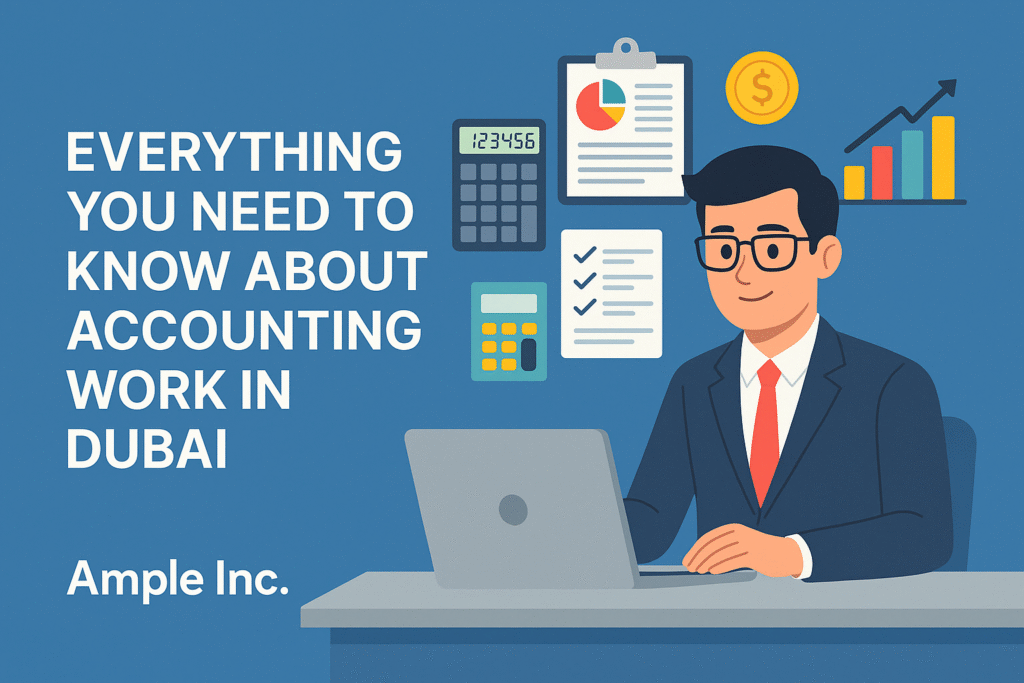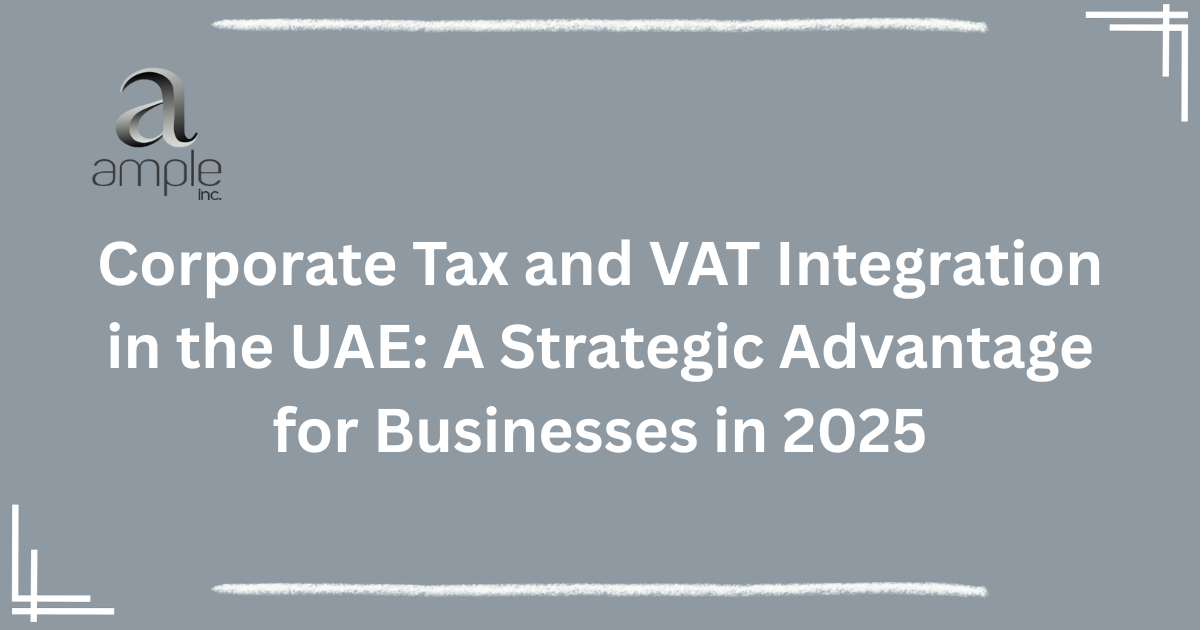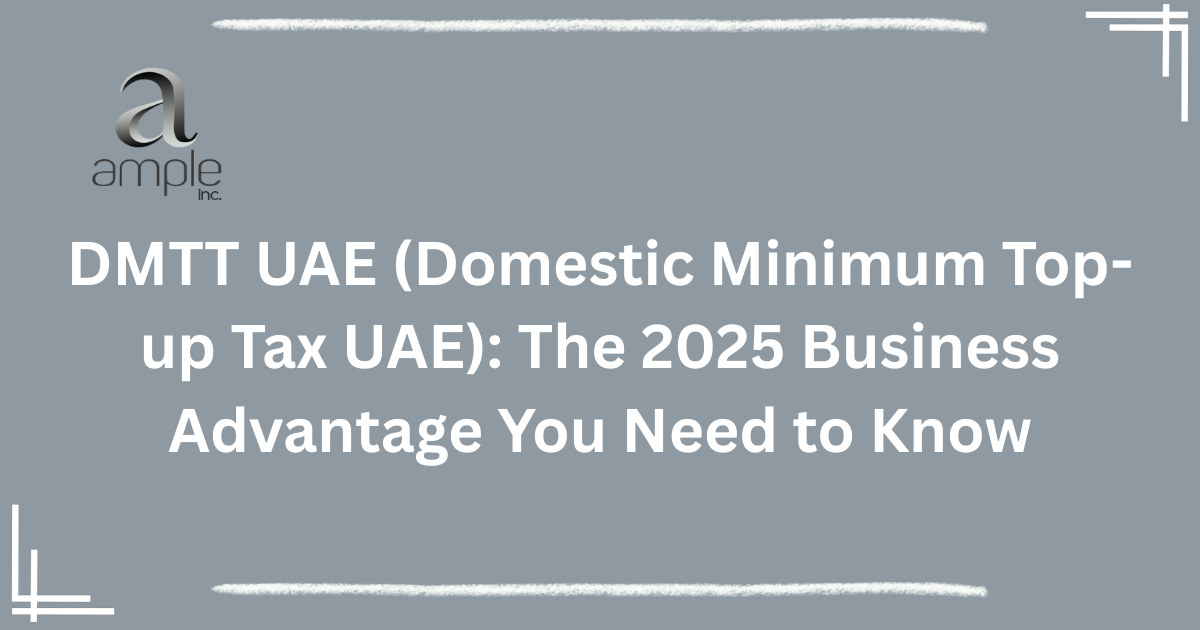Introduction
Dubai is a land of dreams. For many professionals, it is the ultimate destination. Whether you’re a finance graduate, experienced auditor, or a certified accountant, Dubai has something for everyone. Known for its luxury, skyscrapers, and thriving business culture, this city also offers exciting careers in accounting.
Accounting work in Dubai has become increasingly important with the rapid growth of local and international businesses. From handling VAT compliance to managing corporate taxation and internal audits, the role of accountants in Dubai has expanded beyond simple bookkeeping.
In this blog, we’ll dive into every aspect of accounting work in Dubai — the job market, skills required, salary insights, top industries, legal frameworks, educational pathways, and more. If you’re planning to begin or grow your accounting career in Dubai, this guide is exactly what you need.

Why Accounting is Important in Dubai
Accounting is more than numbers. It builds trust. It ensures compliance. It enables growth. Dubai’s business success relies heavily on accurate accounting. As the UAE transitions from an oil-based economy to a diversified financial hub, accounting has become crucial in sectors like construction, real estate, hospitality, healthcare, and technology.
Here’s why accounting holds such a vital place in Dubai’s economy:
- Ensures VAT and tax compliance
- Helps detect and prevent fraud
- Supports business growth through accurate reporting
- Contributes to corporate governance and internal control
Without accounting, no business in Dubai can survive.
Benefits of Working in Dubai as an Accountant
1. High Salaries and Tax-Free Income
One of the biggest benefits is zero personal income tax. You keep 100% of your salary, which is not the case in many countries. Plus, salaries for accounting professionals are competitive.
2. Global Business Hub
Dubai is home to thousands of multinational companies, international banks, and global startups. This gives accountants exposure to different business environments and international accounting standards.
3. Diverse Work Environment
You’ll work with professionals from around the world. It’s common to work in teams of multiple nationalities, which enhances your communication and cultural skills.
4. Quality of Life
Dubai offers safety, luxury living, modern transport, beautiful beaches, and excellent infrastructure. The work-life balance for professionals is well-managed, especially for finance and office jobs.
Types of Accounting Jobs Available in Dubai
1. Bookkeeper
- Maintains daily financial records
- Records cash and credit transactions
- Enters data into accounting software
- Prepares initial financial statements
2. Accounts Payable / Accounts Receivable
- Tracks money coming in and out
- Manages vendor payments
- Handles invoice reconciliations
- Prepares debtor and creditor ledgers
3. General Accountant
- Prepares balance sheets and income statements
- Manages general ledgers
- Supports audit processes
- Ensures compliance with IFRS
4. Management Accountant
- Prepares budgets and forecasts
- Analyzes business performance
- Provides financial advice to management
- Controls costs and improves profitability
5. Tax Accountant
- Handles VAT and corporate tax returns
- Manages tax audits and legal requirements
- Advises clients on tax-saving opportunities
- Tracks tax payments and documentation
6. Internal Auditor
- Reviews internal processes
- Conducts financial risk assessments
- Verifies accuracy of company records
- Recommends operational improvements
7. External Auditor
- Works for audit firms like Deloitte or EY
- Reviews client accounts and operations
- Ensures legal and financial compliance
- Issues independent audit reports
8. Payroll Accountant
- Calculates employee salaries
- Ensures compliance with UAE labour laws
- Manages WPS processing
- Files payroll-related tax documents
9. Financial Analyst
- Interprets financial data and market trends
- Helps in investment decision-making
- Prepares business valuations
Works closely with CEOs and CFOs
Educational Requirements
To start a career in accounting in Dubai, you need:
Minimum Qualifications
- Bachelor’s degree in Accounting, Finance, Commerce, or Business
Preferred Certifications
| Certification | Issuing Body | Benefit |
| ACCA | UK | Popular for global roles |
| CPA | US | Highly valued in firms |
| CA | India/UK | Recognized in senior roles |
| CMA | US | Focuses on cost management |
| CIA | US | Specializes in internal audit |
These certifications significantly boost your chances of being hired and promoted.
Technical Skills Require
- Advanced Excel knowledge (pivot tables, v-lookup, formulas)
- Experience with Tally, QuickBooks, Zoho Books, SAP, or Oracle
- IFRS and UAE VAT knowledge
- Financial statement preparation
- Budgeting and forecasting
- Report generation and reconciliation
- Awareness of UAE Corporate Tax Law
Soft Skills You Need
- Attention to detail
- Time management
- Confidentiality and ethics
- Clear communication
- Problem-solving attitude
- Critical thinking
Accountants are expected to explain complex data simply. Strong soft skills set you apart.
Where Can You Work as an Accountant in Dubai?
1. Multinational Corporations (MNCs)
Large companies like Unilever, Nestlé, Amazon, and Google need finance teams in Dubai.
2. Audit and Tax Firms
Big 4 firms (Deloitte, PwC, EY, and KPMG) have a major presence in Dubai.
3. Government and Semi-Government Entities
Dubai Electricity and Water Authority (DEWA), Dubai Health Authority, RTA, etc., hire in-house accountants.
4. SMEs and Startups
Thousands of startups require accountants for day-to-day bookkeeping and compliance.
5. Freelancing and Consultancy
With the right license, you can offer freelance accounting services to businesses.
Average Salary of Accountants in Dubai
| Role | Experience | Average Monthly Salary (AED) |
| Junior Accountant | 0–2 years | 3,000 – 6,000 |
| Accountant | 2–5 years | 6,000 – 10,000 |
| Senior Accountant | 5–8 years | 10,000 – 14,000 |
| Finance Manager | 8–12 years | 16,000 – 30,000 |
| Financial Controller | 12–15 years | 25,000 – 40,000 |
| CFO | 15+ years | 40,000 – 70,000+ |
Salaries vary based on company size, sector, nationality, and qualifications.
Top Accounting Software Used in Dubai
- QuickBooks – Easy for SMEs
- Tally ERP 9 – Widely used in retail
- SAP – Used by big corporations
- Oracle Financials – Enterprise-level software
- Zoho Books – Cloud-based, ideal for startups
- Xero – Good for freelancers and small businesses
If you master at least two of these, you increase your employability.
Legal and Regulatory Framework for Accountants
Understanding UAE’s accounting laws is crucial.
1. VAT (Value Added Tax)
- Introduced in 2018
- 5% tax on most goods and services
- Businesses earning above AED 375,000 must register
- Accountants ensure accurate filing and records
2. Corporate Tax (2023)
- 9% on taxable business income above AED 375,000
- Exemptions for certain free zone businesses
- Tax planning and compliance are key roles of accountants now
3. AML and ESR
- Anti-Money Laundering (AML) laws require accountants to report suspicious transactions
- Economic Substance Regulations (ESR) require proof of economic activity
Visa and Work Permit Process
Accountants in Dubai typically get employment visas. Companies apply on behalf of employees.
Visa Types
- Employment Visa (2 years)
- Freelance Visa (requires license and setup)
- Golden Visa (10-year residency for exceptional professionals)
Work visas come with medical insurance and Emirates ID.
Where to Find Accounting Jobs
Top Job Portals
- Bayt.com
- Naukrigulf
- Indeed UAE
- GulfTalent
Recruitment Agencies
- Michael Page
- Robert Half
- BAC Executive Recruitment
- NADIA Gulf
Direct Company Websites
Always check the “Careers” section of top firms and MNCs.
Best Accounting Courses and Institutes in Dubai
| Institute | Courses Offered | Duration |
| PwC Academy | ACCA, IFRS, Financial Mod. | 6–12 months |
| Phoenix Financial Training | ACCA, CMA | 6–24 months |
| Zabeel International Institute | Tally, VAT, CPA | 1–6 months |
| Morgan International | CPA, CFA, CMA | 6–12 months |
Upskilling boosts your salary and promotion chances.
Challenges in the Field
Despite the rewards, accounting in Dubai has challenges:
- Changing Tax Regulations
- High Competition
- Workload at Month-End
- Adapting to Different Cultures
- Pressure During Audits
Stay updated and always keep learning to overcome these.
Career Growth Path in Accounting
Dubai allows for rapid professional growth. A common path is:
- Accounts Assistant
- Junior Accountant
- Accountant
- Senior Accountant
- Finance Manager
- Controller
- Chief Financial Officer (CFO)
Final Tips to Succeed as an Accountant in Dubai
- Stay Updated with UAE Tax Laws
- Join Webinars and Finance Communities
- Network at Professional Events
- Earn at least one Certification
- Practice Software Tools Daily
- Be Ready for Interviews with Sample Reports
- Showcase Work on LinkedIn
Emerging Trends in Dubai’s Accounting Sector
1. Automation and AI in Accounting
Many firms are now using AI tools to automate repetitive accounting tasks like data entry, invoicing, and reconciliations. Accountants must learn how to work alongside technology.
2. Cloud-Based Accounting
Tools like Zoho Books, Xero, and QuickBooks Online are becoming standard. They allow remote access, real-time reporting, and secure backups.
3. Focus on Sustainability Reporting
Dubai is aligning with global ESG (Environmental, Social, Governance) trends. Accountants are now expected to assist in sustainability and carbon reporting.
4. Rise of Outsourced Accounting Services
Businesses are outsourcing accounting to reduce costs. Firms offering virtual accounting services are booming.
Accounting for Startups and SMEs in Dubai
1. Why Startups Need Accountants
Startups in Dubai need help with budgeting, forecasting, cost control, and tax compliance from day one.
2. Accounting Tools for Small Businesses
Most startups use cost-effective tools like:
- Wave Accounting
- Zoho Books
- FreshBooks
- Xero
3. Common Accounting Mistakes by Startups
- Mixing personal and business accounts
- Not filing VAT correctly
- Delayed invoicing and receivables tracking
Compliance Requirements for Accountants in Dubai
1. Record-Keeping Obligations
UAE law requires businesses to keep accounting records for at least 5 years. Accountants are responsible for:
- Keeping ledgers
- Retaining supporting documents
- Ensuring secure digital storage
2. Auditing and Year-End Reports
Annual audits are mandatory for most companies. Accountants must assist external auditors by preparing complete and accurate financial statements.
3. AML Compliance Obligations
If you’re working in sectors like real estate, legal, or precious metals, you must comply with Anti-Money Laundering (AML) obligations. This includes:
- Customer Due Diligence (CDD)
- Reporting Suspicious Activity
- Maintaining compliance documentation
Opportunities for Women in Accounting in Dubai
Dubai encourages women’s participation in finance. In accounting:
- Many firms have inclusive policies
- Female accountants hold managerial roles
- Women are encouraged in audit, compliance, and tax roles
Support groups and events such as Women in Finance UAE help female professionals network and grow.
How to Prepare for Accounting Interviews in Dubai
1. Common Interview Questions
- What’s the difference between accrual and cash accounting?
- How do you handle VAT filing?
- Tell us about a time you found an accounting error.
- What ERP systems are you familiar with?
2. What Recruiters Expect
- Knowledge of UAE VAT & Corporate Tax
- Ability to prepare financial statements
- Proficiency in Excel and accounting software
- Good communication and ethics
Freelance Accounting and Virtual Services in Dubai
Freelance accounting is on the rise. To do this legally, you must:
- Get a Freelance License from a free zone like Fujairah Creative City or Dubai Media City
- Register for VAT if applicable
- Maintain separate business bank accounts
Freelancers provide services like:
- VAT filing
- Bookkeeping
- Payroll
- Financial consultancy
Key Government Bodies Related to Accounting in Dubai
| Organization | Role |
| Federal Tax Authority (FTA) | Regulates VAT and corporate tax laws |
| Ministry of Economy (MOE) | Monitors audit firms and financial reporting standards |
| Dubai Economy (DED) | Issues trade licenses for accounting firms |
| UAE Ministry of Finance | Implements corporate tax and fiscal policies |
Understanding these bodies helps accountants stay compliant.
Continuing Professional Development (CPD) for Accountants
If you’re ACCA, CPA, or CA certified, you must complete yearly CPD hours. You can:
- Join workshops
- Take online courses
- Attend webinars
- Read technical updates
CPD ensures you remain up-to-date with changing laws and tools.
How Accounting Supports Business Success in Dubai
- Cash Flow Management: Ensures enough funds to pay bills and grow.
- Budgeting: Helps departments plan resources wisely.
- Investor Confidence: Accurate reporting attracts investors.
- Risk Management: Identifies fraud or overspending early.
Accounting doesn’t just track income—it drives decision-making. Here’s how it supports business success:
Conclusion
Accounting is not just a job in Dubai—it’s a strategic function. Accountants are crucial in helping businesses comply with the law, stay profitable, and grow sustainably.
This guide has covered everything: from job types and salaries to skills, software, and even trends. Whether you’re starting out or expanding your career, this blog equips you with the latest knowledge.
Dubai’s accounting landscape is full of opportunities. So, polish your resume, build your skills, and take the next step towards a rewarding career in one of the world’s most vibrant business cities.



